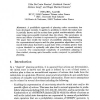Free Online Productivity Tools
i2Speak
i2Symbol
i2OCR
iTex2Img
iWeb2Print
iWeb2Shot
i2Type
iPdf2Split
iPdf2Merge
i2Bopomofo
i2Arabic
i2Style
i2Image
i2PDF
iLatex2Rtf
Sci2ools
133
click to vote
ECP
1997
Springer
1997
Springer
Possibilistic Planning: Representation and Complexity
A possibilistic approach of planning under uncertainty has been developed recently. It applies to problems in which the initial state is partially known and the actions have graded nondeterministic effects, some being more possible (normal) than the others. The uncertainty on states and effects of actions is represented by possibility distributions. The paper first recalls the essence of possibilitic planning concerning the representational aspects and the plan generation algorithms used to search either plans that lead to a goal state with a certainty greater than a given threshold or optimally safe plans that have maximal certainty to succeed. The computational complexity of possibilistic planning is then studied, showing quite favorable results compared to probabilistic planning.
Related Content
| Added | 07 Aug 2010 |
| Updated | 07 Aug 2010 |
| Type | Conference |
| Year | 1997 |
| Where | ECP |
| Authors | Célia da Costa Pereira, Frédérick Garcia, Jérôme Lang, Roger Martin-Clouaire |
Comments (0)

